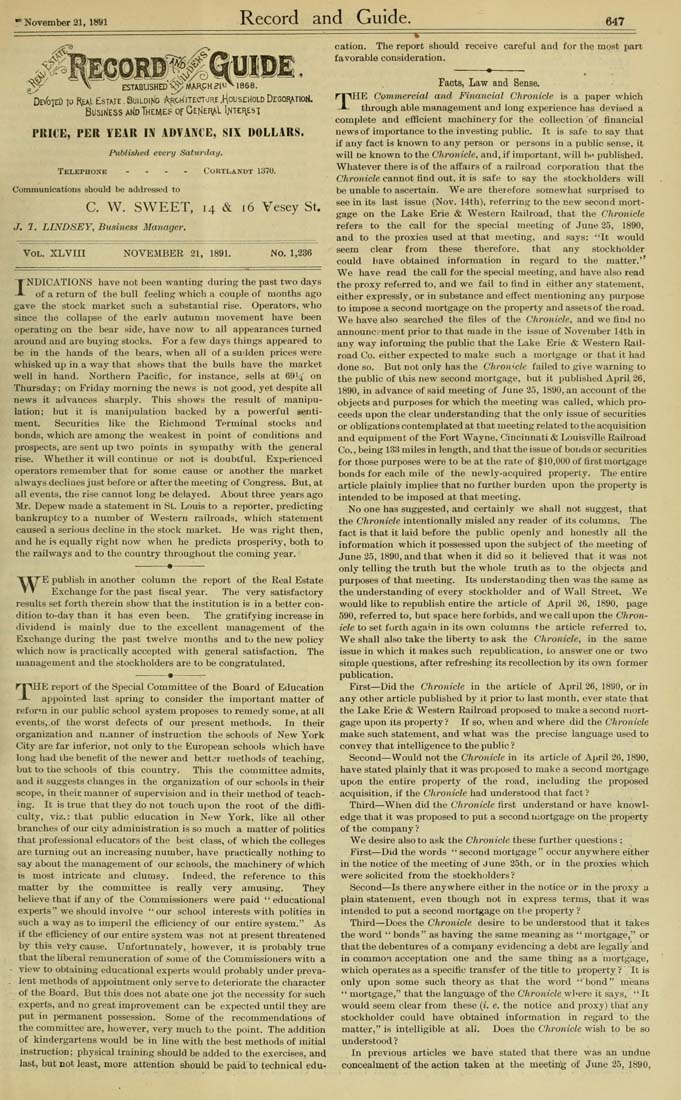
Text version:
Please note: this text may be incomplete. For more information about this OCR, view
About OCR text.
"November 31, 1891 Record and Guide. 647 ilil ^ \\ ESTABUSHED^1VW.CH21U^I868. De/oth) to Rf^L Estwe . Buildi;/o Aj!.oi
purpose to impose a second mortgage on the property and assets of the road. We have also searched the flies of the Chronicle, and we find no announcement prior to that made in the issue of November 14th in any way informing the public tbat the Lake Erie & Western Rail¬ road Co. either expected to make such a mortgage or that it had done so. But not only has the Chronicle failed to give warning to the public of this new second mortgage, but it published AprU. 36, 1890, iu advance of said meeting of June 3d, 1890, an account of the objects and purposes for which the meeting was called, which pro¬ ceeds upon the clear understanding that the only issue of securities or obligations contemplated at that meeting related to the acquisition and equipment of the Fort Wayne, Cincinnati & Louisville Railroad Co., being 133 miles in length, and that the issue of bonds or securities for those purposes were to be at the rate of $10,000 of first mortgage bonds for each mile of the newly-acquired property. The entire article plainly implies that no further burden upon the property is intended to be imposed at that meeting. No one has suggested, and certainly we shall not suggest, that the Chronicle intentionally misled any reader of its columns. The fact is that it laid before the public openly and honestly all the information which it possessed upon the subject of the meeting of June 35, 1890, and that when it did so it believed that it was not only telling the truth but the whole truth as to the objects and purposes of that meeting. Its understauding then was the same as the understanding of every stockholder and of Wall Street. We would like to republish entire the article of April 36, 1890, page 590, referred to, but space here forbids, and we call upon the Chron¬ icle to set furth again in its own columns the article referred to. We shall also take the liberty to ask the Chronicle, in the same issue in which it makes such republication, to answer one or two simple questions, after refreshing its recollection by its own former publication. First—Did the Chronicle in the article of April 36, 1890, or in any other article published by it prior to last month, ever state that the Lake Erie & Westem Railroad proposed to make a second mort¬ gage upon its.property? If so, when and where did the Chronicle make such statement, and what was the precise language used to convey that intelligence to the public? Second—Would not the Chronicle in its article of April 36,1890, have stated plainly that it was proposed to make a second mortgage upon the entire property of the road, including the proposed acquisition, if the Chronicle had understood that fact ? Third—When did the Chronicle first understand or have knowl¬ edge that it was proposed to put a second mortgage on the property of the company ? We desire also to ask the Chronicle these further questions: First—Did the words "second mortgage" occur anywhere either in the notice of the meeting of June 35th, or in the proxies which were solicited from the stockholders ? Second—Is there anywhere either in the notice or in the proxy ii. plain statement, even though not in express terms, that it was intended to put a second mortgage on the property ? Third—Does the Chronicle desire to be understood that it takes the word " bonds" as having the same meaning as " mortgage," or that the debentures of a company evidencing a debt are legally !and in commo.a acceptation one and the same thing as a mortgage, which operates as a speciflc transfer of the title to property ? "It is only upon some such theory as that the word "bond" ineans " mortgage," that the langiiage of the Chronicle wl'ere it says, "It would seem clear from these (i. e. the notice and proxy) that'any stockholder could have obtained information in regard to the matter," is intelligible at all. Does the Chronicle wish to be so understood ? In previous articles we bave stated that there was an undue concealment of tbe action taken at the meetin;g of June 35,1890,
